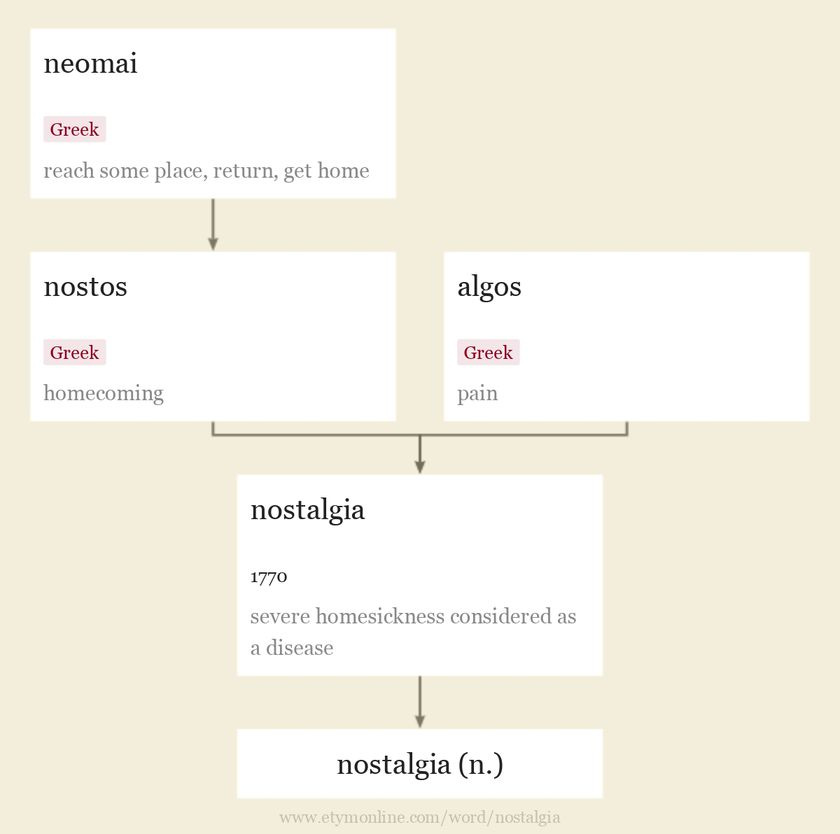Listening to holiday music this morning, this word came to my mind. It has a fascinating history, naming a specific type of depressive homesickness known particularly to convicts, slaves, soldiers, and sailors, sometimes triggered by certain music.
Thinking about it, I wondered what it was that caused me to listen to this type of music every year, and why the experience is a confluence of joy and sadness for me. Growing up in the 80s watching old movies about a Victorian miser named Scrooge certainly gave me a sense that there was some kind of culture out there related to my own, but distant and peculiar. Rudolph the Red-Nosed Reindeer exposed me to Burl Ives, a jolly mustachioed folkie, familiar yet strange. A Charlie Brown Christmas gave me an imagined glimpse of a nearly-diverse 1960s where jazz music was popular.
Obviously, I don’t experience a clinical-level depression from hearing these things. I don’t have a real lived reality where I experienced any of these worlds. Still, they are icons in some emotional landscape constructed diffusely in abstraction, stitched in alongside other relics in the tapestry like the Doors and the Beatles, who seemed to be everywhere in the 90s. It would grow stronger and weirder in high school and college as I got into beatniks and Bing Crosby, Walt Whitman, Stephen Foster and European orchestral music. As a roughly fifth-generation-ish descendent, I have no real memory of any German, Norwegian, or Irish rituals, but for eating Lefse at Christmas. Still, I have the sense that a history exists, and that it somehow influences me.
“Neither Nostalgia Nor Utopia!” John Vervaeke boasts he’d like etched into his tombstone. He envisages this foundation in a faithfulness to cognition of the Present as a tenant of his aspiration to awaken from a Meaning Crisis. It’s quite an idea, and I wish him the best as I benefit from having learned from his lectures and talks.
I’ve felt this absence of meaning in my life. It emerges in sense that older traditions which united family and tribe together in a religiospiritual ritual participation have been replaced mostly with “secular” forms that don’t seem to resonate as richly at the symbolic level. The concept of nostalgia reminds me that the answer is not to think that we can go back to some better time. Doing so would not only be impossible, it would also be destructive in a number of ways. But the urge is there, and each December I experience it when I un-shelve a compendium of music that we only play during a certain season. It’s revealing something. What? I don’t know.
Below, I’m going to offer the Etymonline.com definition of “nostalgia.” It’s too wonderful to excerpt. I hope you enjoy reading it, and might consider supporting them. The etymology dictionary has served as a great resource for me over the past ten years.
nostalgia (n.)
1726, "morbid longing to return to one's home or native country, severe homesickness considered as a disease," Modern Latin, coined 1688 in a dissertation on the topic at the University of Basel by scholar Johannes Hofer (1669-1752) as a rendering of German heimweh "homesickness" (for which see home + woe).
From Greek algos "pain, grief, distress" (see -algia) + nostos "homecoming," from neomai "to reach some place, escape, return, get home," from PIE *nes- "to return safely home" (cognate with Old Norse nest "food for a journey," Sanskrit nasate "approaches, joins," German genesen "to recover," Gothic ganisan "to heal," Old English genesen "to recover"). French nostalgie is in French army medical manuals by 1754.
Originally in reference to the Swiss and said to be peculiar to them and often fatal, whether by its own action or in combination with wounds or disease.
[Dr. Scheuzer] had said that the air enclosed in the bodies of his countrymen, being in Æquilibrium with a rare and light air that surrounds them, was overloaded in lower countries with an air more dense and heavier, which compressing and obstructing the capillary vessels, makes the circulation slow and difficult, and occasions many sad symptoms. [Account of the publication of "Areographia Helvetiæ" in New Memoirs of Literature, London, March 1726]
By 1830s the word was used of any intense homesickness: that of sailors, convicts, African slaves. "The bagpipes produced the same effects sometimes in the Scotch regiments while serving abroad" [Penny Magazine," Nov. 14, 1840]. It is listed among the "endemic diseases" in the "Cyclopaedia of Practical Medicine" [London, 1833, edited by three M.D.s], which defines it as "The concourse of depressing symptoms which sometimes arise in persons who are absent from their native country, when they are seized with a longing desire of returning to their home and friends and the scenes their youth ...."
It was a military medical diagnosis principally, and was considered a serious medical problem by the North in the American Civil War:
In the first two years of the war, there were reported 2588 cases of nostalgia, and 13 deaths from this cause. These numbers scarcely express the real extent to which nostalgia influenced the sickness and mortality of the army. To the depressing influence of home-sickness must be attributed the fatal result in many cases which might otherwise have terminated favorably. ["Sanitary Memoirs of the War," U.S. Sanitary Commission, N.Y.: 1867]
Transferred sense (the main modern one) of "wistful yearning for the past" is recorded by 1920, perhaps from such use of nostalgie in French literature. The longing for a distant place also necessarily involves a separation in time.





evocative & resonant. you have a way with words, Aaron. blessings to you.